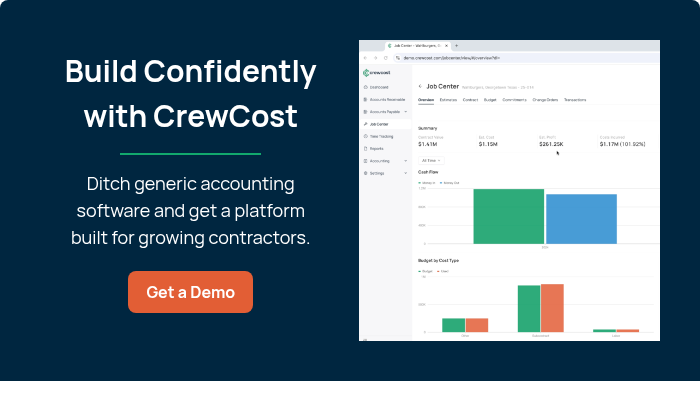We’re better when we work together, especially in the construction industry. And in an effort to build a better system of collaboration and communication, project teams sometimes use Integrated Project Delivery (IPD) contracts. From the GC and subcontractors to the architect and owner, the IPD method brings everyone together to form a multi-part contract. From design and development to closeout, each of these parties works together under an IPD contract to share project risks (and reap the rewards).
Key Takeaways
- Integrated project delivery contracts in construction offer a shared risk/reward model for project stakeholders. Under a single contract for design and construction, the architect, contractor and owner are tied together for a single dollar value.
- When done effectively, an IPD contract helps align the interests, objectives and practices of all parties involved in a job.
What is an Integrated Project Delivery Contract?
IPD contracts follow the old saying: “There is no ‘I’ in team”. Unlike other contract types, an integrated project delivery contract starts with assembling a project team at the phasing stage of the project, versus post-phase or signing of the design contract.
With the goal of achieving the highest level of efficiency, IPD contracts aim to combine the expertise of all participants (owner, architect, consultants, design and construction teams) and lean on their individual capabilities and strengths throughout the project. In turn, this helps foster transparency and trust via more information sharing (and hopefully less finger-pointing). Under this type of contract, everyone is working together to meet project goals, maximize their time, and mitigate risks.
Pros & Cons of Integrated Project Delivery Contracts for Construction
While IPD contracts may initially sound like a dream, they have advantages and disadvantages and require a lot of trust to execute successfully.
Pros
- Thanks to more consistent communication throughout the job, you’ll see higher efficiency and less waste of both materials and time.
- IPD contracts lower the amount of change orders due to all parties being involved at all stages
- The owner is removed as a middleman between you and the design team, making collaboration easier and more streamlined.
- There is a shared risk/reward component based on the financial outcome of the project, which motivates all parties equally.
Cons
- Integrated project delivery contracts themselves are quite complex. Because the roles between all parties are sometimes blurred, a lot of trust is required.
- As your profit is tied to project success, delays and other conflicts that impact different members can negatively impact your profit.
- Instead of defined roles of decision-making, the democratic process can at times be more cumbersome versus having one clearly appointed decision-maker.
How Are Integrated Project Delivery Contracts Useful?
For more complex projects like hospitals, stadiums and large production plants, IPD contracts can be a great fit. However, because of the nature of shared risks, it’s not recommended to enter an IPD contract if you haven’t worked with a design team or owner before. This type of contract necessitates a high level of familiarity and trust, making it a good option for clients you’ve successfully worked with on past jobs. Before entering into an IPD contract though, make sure you fully understand the nuances and complexities of the project at hand.
How Integrated Project Delivery Affects Profitability
As we touched on above, you’re only as good as your weakest link when it comes to integrated project delivery contracts. Remember, you’re all working under one contract, with an expected profit margin for the whole contract. This is based on the expected resources each contractor estimated they’d need to contribute. If you have to perform more work or dedicate more resources than what is under the scope you are responsible for, you might help push the project forward but it could eat into your company’s overall margin. For example, you don’t want to get stuck in a situation where you need to perform site due diligence, even though it was clearly marked in the engineer/consultant’s scope. If you don’t stay in your assigned ‘lane’ and only do the tasks clearly defined in your scope, you’ll quickly see your profit margin dwindle.
Best Practices for Contractors
Integrated project delivery contracts rely heavily on trust and collaboration. Your team has to have trust in the designers (and vice versa), and you shouldn’t ever feel like you have to step into anyone’s roles in order to move progress along. Each party should be capable of meeting their own milestones and staying on schedule.
One big tip here: Because all key players get involved early under IPD contracts, that means early goal definition is critical. This means the project planning stage is intensified and streamlined to make use of everyone’s expertise and hopefully save costs during execution. To do this successfully, every stakeholder needs to mutually agree upon job milestones and the expectations surrounding them.
Another key part of navigating these contracts is dispute resolution. When everyone is tied together, clashes in opinion are bound to happen. Having a process in place to settle disagreements and come to a speedy resolution is key.
Further Reading: A Guide to the 8 Types of Construction Contracts
Jarone started his construction career working for a commercial general contractor in Los Angeles, before transitioning to being an Owner's Representative for the past eight years. Jarone has led multiple projects and has been integral in cross-departmental communication and implementation of processes with design, leasing, planning and facilities/operations teams.

